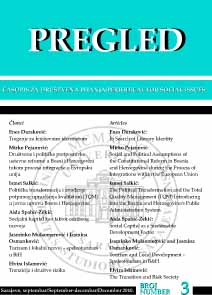Društvene i političke pretpostavke ustavne reforme u Bosni i Hercegovini tokom procesa integracije u Evropsku uniju
Social and Politican Assumptions of the Constitutional Reform in Bosnia and Herzegovina during the Process of Integrations within the Europen Union
Author(s): Mirko PejanovićSubject(s): Politics / Political Sciences
Published by: Univerzitet u Sarajevu
Summary/Abstract: The main social process taking place in Bosnia and Herzegovina after the Dayton Peace Agreement from 1995 is the internal integrative process and ascension of Bosnia and Herzegovina into the European Union and NATO Alliance. The power of the European integration process occurs as a of internal integration drive force. Not only that, it also appear to be a driver for implementation of reforms that allow the building of European standards in economic, political and cultural sectors. Reforms implementation is carried out within the activities of Bosnian democratic forces and activities of the International Community’s institutions. Many of the carried out reforms are made possible through the moderation and influence of the International Community’s institutions. In the first years of post-war reconstruction, the International Community provided donor funds in the amount of five billion U.S. dollars. These funds had been used for restoring communal and social infrastructure. Roads were reconstructed and new conditions created for the renewal of economic life. Due to the slow course of privatization of state enterprises, new economic structure has not yet been restored. Until 2002, the International Community was the parliamentary elections organizer. It turned out that position of the International Community that democracy was getting strengthened by frequent elections and a shorter two-year term of parliamentary bodies was illusory. Thus, in the time period from 1996 until 2002 was carried out in three election cycles for the parliaments of the entities and the Parliamentary Assembly of Bosnia and Herzegovina. After 2002, four-year terms of parliamentary bodies were introduced. These are the following mandates: from 2002-2006 and 2006 to 2010. In these two mandates of the Parliamentary Assembly of Bosnia and Herzegovina, the ruling majority were uni-ethnic parties. These parties are deriving their political concepts of social development out of the collective ethnic groups. On this basis in the structure of the pluralism, ethnic parties are receiving the main power in the elections for the parliaments.
Journal: PREGLED - časopis za društvena pitanja
- Issue Year: LI/2010
- Issue No: 3
- Page Range: 53-70
- Page Count: 18
- Language: Bosnian

